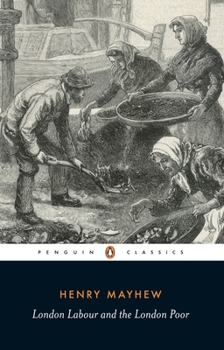London Labour and the London Poor
Select Format
Select Condition 
Book Overview
Unflinching reports of London's poor from a prolific and influential English writer London Labour and the London Poor originated in a series of articles, later published in four volumes, written for the Morning Chronicle in 1849 and 1850 when journalist Henry Mayhew was at the height of his career. Mayhew aimed simply to report the realities of the poor from a compassionate and practical outlook. This penetrating selection shows...
Format:Paperback
Language:English
ISBN:0140432418
ISBN13:9780140432411
Release Date:April 1985
Publisher:Penguin Group
Length:544 Pages
Weight:0.80 lbs.
Dimensions:0.9" x 5.2" x 7.8"
Age Range:18 years and up
Grade Range:Postsecondary and higher
Customer Reviews
4 ratings
Dickens before Dickens
Published by Thriftbooks.com User , 14 years ago
When I was 12 I was browsing in old Leary's books in Phila and I came across the 4 volume addition of this as published by Dover. I bought it on a whim.This has become one of my favorite books. A true time machine.
Indispensable: Portraits of Victorian Working Class People
Published by Thriftbooks.com User , 19 years ago
This review refers to the Penguin Classics edition of Henry Mayhew's 'London Labour and the London Poor' which is an abridged version of the original four volume version published in 1851-52. Though Henry Mayhew wrote several novels, his name is primarily remembered as the author/complier of this journalistic work 'London Labour and the London Poor.' The present selection gives the best part of the original four volume book, which captures exactly what the title says -- London labour and the poverty-stricken people living there. The selction includes some figures or statistics about the working class people, such as the estimated amount of money these workers gain every day (and meagre one), but the most interesting part is the first-hand records about the ways of life of various lines of works in London, directly taken from the people engaged in these works. The jobs (and some of them hardly deserve the name 'jobs') recorded here are, to name a few, street-sellers such as fried fish, watercresses, matches, baked potatoes, etc.; street-buyers such as old clothes or 'dust'; street-performers like 'conjurors,' musicians, or fire-eaters (with his own descriptions about how to eat fire), but the most fascinating is the records about boys (and some girls) who run away from parents, and lives in the street of London, who literally lives by begging or stealing. Many interesting facts are recorded by Mayhew (or his assistants), directly from the persons the book deals with, and the original words spoken by there labourers are preserved as much as possible. To read, or to listen to them is one of the greatest merits of the book, for the languages of the interviewees retain the peculiar speeches you find in many Dickensian characters, and in fact you will realize that Dickens didn't exaggerate when he created Sam Weller. And the London you see here is the London Charles Dickens knew. What did Jo in 'Bleak House' was sweeping in the street? Who gave that permission? What is the nature of 'the dust' you hear in 'Our Mutual Friend'? What was the regulations of the 'workhouse'? All these thing are answered in this vividly realized collections of the Victorian working class portraits. This book is still a valuable source for anyone who is interested in Victorian period, and will be. Buy one now.
Look up "humour" in the Britannica. This is it.
Published by Thriftbooks.com User , 24 years ago
Henry Mayhew, having created this delightful encyclopoedia of humanity, has probably been ripped off more frequently than any writer since Shakespeare. His characters are so animated they have jumped full-fleshed from the pages of his books into the works of many another humorist or novelist, and we all owe more to him than we can know.While the living conditions suffered by the poor were truly deplorable, Mayhew might have enjoyed the company of street people more than that of his peers. He put so much life into his characters we can see them, hear them, smell them. I only wonder what the street people thought about Mr. Mayhew, the journalist who bought them beers,inveigled invitations to tea, listened tirelessly to their stories. Mayhew is neither sentimental nor brutal, but rather a true and tolerant humourist, and I believe that, for all the misery depicted, his work was undertaken with great, and contagious, joy.
A must-read for those interested in Victorian England
Published by Thriftbooks.com User , 24 years ago
Henry Mayhew, founder of Punch magazine, wrote this four-volume sociological classic during the 1850's. If you are at all interested in the Victorian era, in British history, in London, or in urban history in general, this is a must-read. The Penguin version is abridged and is a distillation of the "best" of the multiple-volume set. This distillation is itself over 500 pages, so imagine the impact of the entire set! The utter destitution of the London poor is set out in such vivid detail than one cannot help being shocked at the conditions human beings were forced to live in in the greatest city of its time. The only fault I find with this book is Mayhew's occasional lapses into preaching. Otherwise a fine book




